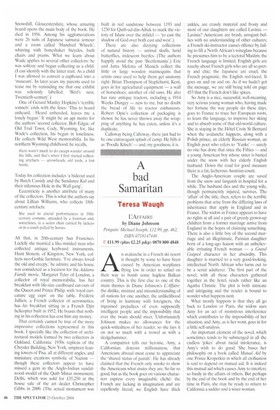A bad Samaritan
Teresa Waugh
EAFFAIRE by Diane Johnson Penguin! Michael Joseph, £12.99, pp. 462, ISBN 0718147448
e £11.99 (plus £2.25 p&p) 0870 800 4848 An avalanche in a French ski resort is thought by some to have been caused by American warplanes flying low in order to refuel on their way to bomb some hapless Balkan country. This is the first clue to one of the main themes in Diane Johnson's L'Affaire: the dislike, mistrust and misunderstanding of all nations for one another, the unlikelihood of living in harmony with foreigners, the ingrained prejudices of even supposedly intelligent people and the impossibility that ever the twain should meet. Unfortunately Johnson makes no allowances for the quick-wittedness of her reader, so she lays it on not so much with a trowel as with a sledgehammer.
A compatriot tells our heroine, Amy, a Californian dotcom millionairess, that Americans abroad must come to appreciate the 'shared status of pariah'. He has already claimed that the French only smoke to show the Americans what sissies they are. So far so good, but as the book goes on various characters express every imaginable cliché: the French are lacking in imagination and are repellently literal; we English have thick ankles, are crassly material and frosty and most of our daughters are called Lavinia — Lavinia? Americans are brash, arrogant bullies with no understanding of other cultures; a French ski-instructor causes offence by failing to fill a North African's wineglass because he presumes him to be a teetotal Muslim; the French language is limited; English girls are touchy about French girls who are all so pretty and chic; the Japanese are cruel, the French pragmatic, the English red-faced. It goes on and on and on. As if we hadn't got the message, we are still being told on page 453 that the French don't like spices.
So Amy is a nice, successful, well-meaning, very serious young woman who, having made her fortune the way people do these days, goes to France to trace her European roots, to learn the language, to improve her skiing and to absorb some of that old-world culture. She is staying in the Hotel Croix St Bernard when the avalanche happens, along with a Polish prince, an elderly Russian woman, an English poet who refers to 'Yanks' — surely no one has done that since the Fifties — and a young American boy whose sister is buried under the snow with her elderly English husband. Down the road for good measure there is a fat, lecherous Austrian count.
The Anglo-American couple are saved from the snow and languish in hospital for a while. The husband dies and the young wife, though permanently injured, survives. The 'affair' of the title, then, refers to the terrible problems that arise from the differing laws of inheritance that apply in England and in France. The widow in France appears to have no rights at all and a pair of greedy grown-up children from a former marriage arrive from England in the hopes of claiming something. There is also a little boy of the second marriage and an illegitimate, Parisian daughter born of a long-ago liaison with an unbelievable irritating French woman — a Grand Guignol character in her absurdity. This daughter is married to a very good-looking, intellectual North African who turns out to be a serial adulterer. The first part of the novel, with all these characters gathered together in the hotel, reads rather like an Agatha Christie. The plot is both intricate and intriguing and the reader is bound to wonder what happens next.
What mostly happens is that they all go back to London or Paris, the widow sues Amy for an act of monstrous interference which contributes to the impossibility of her situation, and Amy, as is her wont, goes in for a little self-analysis.
An important element of the novel, which sometimes tends to be submerged in all the endless 'jokes' about racial intolerance, is Amy's wish to do good. She bases her philosophy on a book called Mutual Aid by one Prince Kropotkin in which all civilisation is said to depend on mutual aid. It is indeed this mutual aid which causes Amy to interfere so busily in the affairs of others. But perhaps by the end of the book and by the end of her time in Paris, she may be ready to return to California a sadder and a wiser woman.
























































































 Previous page
Previous page